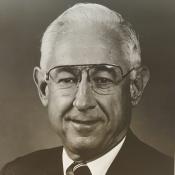Arthur Ramer Wyatt
 A man of principle and conviction, known for his independence and clear thinking, Arthur Ramer Wyatt helped shape the accounting profession in both national and international spheres through distinguished careers in both academe and accounting practice.
A man of principle and conviction, known for his independence and clear thinking, Arthur Ramer Wyatt helped shape the accounting profession in both national and international spheres through distinguished careers in both academe and accounting practice.
At the age of five, he was struck by a car while crossing a street in his home town of Aurora, Illinois. The doctors told his parents that the fractures in his right leg were so serious that he might never walk again. Fortunately for this top notch golfer and enthusiastic supporter of athletics, the leg mended and recovered fully. Working as a caddy, he learned to play and love golf and also met a number public accounting partners who kindled his interest in an accounting career. During high school, a teacher recognized his boredom with an accounting-bookkeeping class and enlisted him in maintaining the accounting records for the schools 45 student organizations and also initiated his teaching career by arranging for him to teach accounting to a local businessman.
He graduated from high school on a Friday in June of 1945 and entered the University of Illinois on the following day in order to get one semester of college out of the way before being drafted. Of course, the war ended that summer, and he was not drafted until 1955 when he began two years of service in the Army. Describing his undergraduate experience, he notes, "The decision to start school when I did was fortuitous, as I never had a teaching assistant or an instructor. They were all off fighting the war. Also, I got a semester ahead academically which permitted me to take lighter schedules in the spring semesters when I was on the golf team."
Upon completing his baccalaureate degree in accountancy, he was persuaded by Professor Cecil (Tee) Moyer to enter the masters program and accept a teaching assistantship. "The world was backwards," he recalls. "I should have been paid to undertake graduate work; the teaching I would have done for nothing." Because he enjoyed the classroom so much, he decided to obtain a Ph.D. which he received in 1953, upon completion of a dissertation titled, "The Influence of Tradition in Accounting." In 1952, as his Ph.D. program concluded, he began fifteen years of assistance to the university's golf coach—who had been his coach during undergraduate days—by working with the players and traveling with the team. He also had success as an amateur golfer during these years, winning club and local championships.
Following completion of his Ph.D. degree, he joined the Accountancy faculty at the University of Illinois where he strongly influenced graduate and undergraduate students, authored many books and articles—including his classic study of accounting for business combinations—and progressed to the rank of full professor. Except for two years in the Army, he remained at Illinois until 1966. In June of that year he left to begin a second career in public accounting with Arthur Andersen & Co., becoming a partner just two years later. He joined the firm's accounting principles group, working under the leadership of George Catlett. When Catlett retired, he assumed leadership of the group which had responsibility for the firm's basic accounting policies, a role in which he was distinguished for his independence of thought and soundness of judgment.
In 1973, he was appointed to membership on the Accounting Standards Executive Committee of the American Institute of Certified Public Accountants (AICPA); he chaired the committee from 1977 to 1979. He served on the Financial Accounting Standards Advisory Council from 1978 to 1981 and the AICPA Board of Directors from 1980 to 1984.
In January 1985, he left Arthur Andersen & Co. to become a member of the Financial Accounting Standards Board, where he served until his resignation in November of 1987. Upon returning to his firm, he was appointed by the AICPA as the United States representative on the International Accounting Standards Committee. He chaired that committee from July 1990 until January 1993 and is widely credited with laying the groundwork for a new era of international cooperation in the development of accounting principles.
His extensive record of contributions to organizations includes service as president of the American Accounting Association, vice-president of the AICPA, and member of countless committees and boards of professional groups, community organizations, and businesses. He was also a tireless worker on behalf of his alma mater, the University of Illinois.
When he retired from Arthur Andersen & Co. in 1992, he rejoined the University of Illinois faculty for 10 years. He resided in Champaign, Illinois, and spent his winters in Florida. His enthusiasm for golf had led him to sponsor several young professional golfers, and he attended a number of major golf tournaments every year. He was the 61st member of the Accounting Hall of Fame. Arthur Ramer Wyatt died on November 17, 2017 at age 90.
 A man of principle and conviction, known for his independence and clear thinking, Arthur Ramer Wyatt helped shape the accounting profession in both national and international spheres through distinguished careers in both academe and accounting practice.
A man of principle and conviction, known for his independence and clear thinking, Arthur Ramer Wyatt helped shape the accounting profession in both national and international spheres through distinguished careers in both academe and accounting practice.